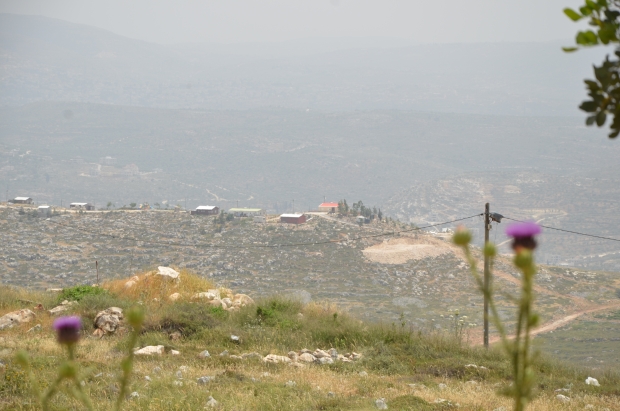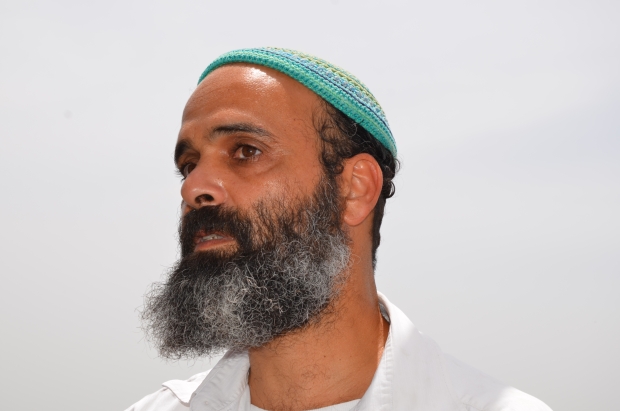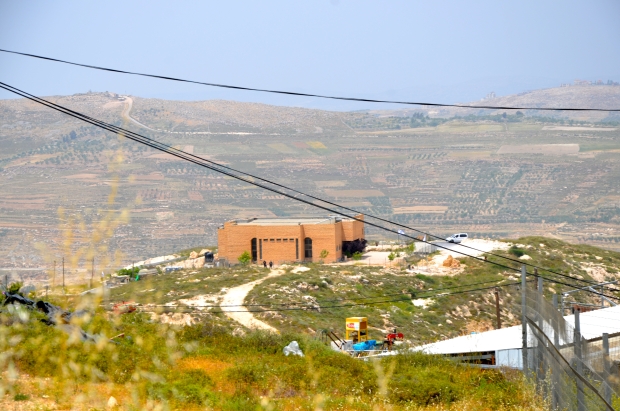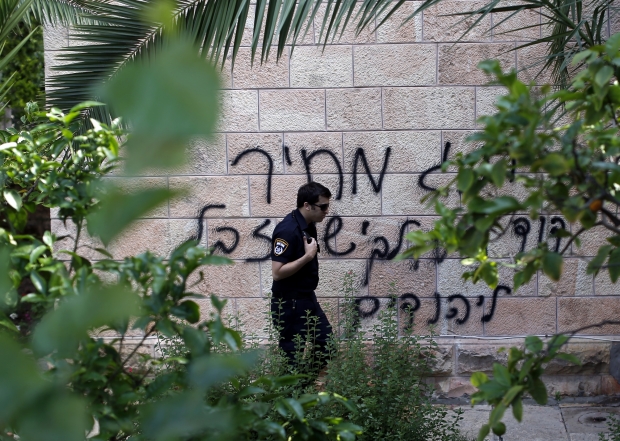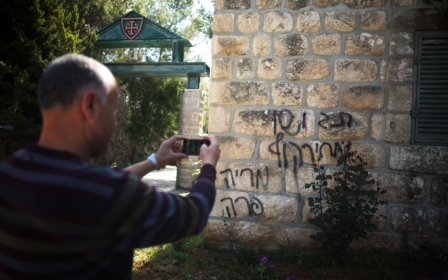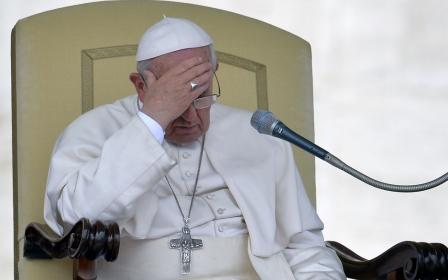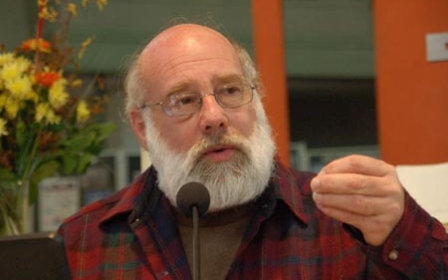Into the dark heart of Israel's settler violence
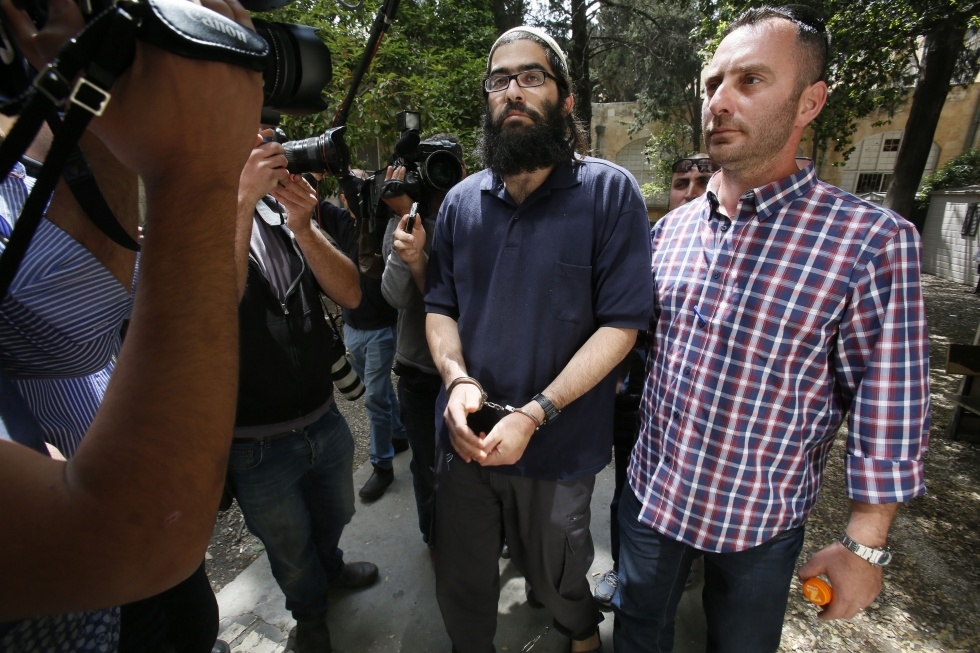
Yitzhar, WEST BANK - An hour’s drive from Jerusalem, along highway 60 and north of Tapuach junction, a ring of Jewish hilltop settlements sit like watchtowers over the Palestinian city of Nablus and at least 10 smaller Palestinian villages.
One of these, Yitzhar, has gained a reputation as the most extreme Jewish settlement in Israeli-occupied West Bank - not only for the “price-tag” violence towards Israeli-Arabs that has grabbed headlines this month, but also for attacks on Israeli Army who have dismantled “illegal” structures there.
The government has created a zone for 1,000 family houses at Yitzhar, which is located 800 metres above sea level. But scattered on the settlement’s outskirts are a series of outpost buildings that the state deems illegal.
The main illegal outposts are Lehavat Yitzhar, which has five scruffy caravans and six permanent structures housing 10 families and Shalhavet Farm in the west, although there are others that have been demolished and rebuilt.
New MEE newsletter: Jerusalem Dispatch
Sign up to get the latest insights and analysis on Israel-Palestine, alongside Turkey Unpacked and other MEE newsletters
In April, the community hit Israeli headlines for throwing stones, burning tyres and blocking streets when border police entered the settlement to demolish the illegal structures.
"In Yitzhar, as opposed to other settlements, there are violent individuals,” Defence Minister Moshe Ya'alon told Haaretz about the attacks. “We will not allow a marginal, violent, extreme group to take the law into their hands,” he said.
Standing on a hilltop looking out over the Palestinian villages of Burin and Urif, Yitzhar settlement spokesman Ezri Tobi told Middle East Eye that the majority of residents are against the violence towards soldiers, adding that they had had a small-scale referendum on such reprisals.
“We had a very tense vote - 97 percent agreed that no violence should be committed against soldiers and the army, while 3 percent abstained,” he said. “We’re in a very delicate situation here. We also decided a major red line for us not to cross is throwing stones - no puncturing tyres and no tents being torn down.”
It is clear tensions are running high: On 6 May, an eight-month pregnant, 22-year-old resident was arrested for inciting violence against Israeli soldiers. Eliraz Fein has since been sentenced to seven days' house arrest.
Fein had said in a closed online forum called Yizharniks that throwing rocks at border forces was acceptable, “even if the rock causes the death of a soldier”. Yizharniks is a play on the words Palmachniks - the Palmach were an elite fighting force of the Haganah, the Jewish underground army prior to the establishment of Israel in 1948.
Another 17-year-old male resident had replied online saying that there was “no problem in killing a soldier during a night-time eviction”. He went on to add that Jewish law permitted killing anyone breaking and entering and posing a threat to life.
The comments were forwarded to the police and the central command by one of the forum participants.
Tobi said that in defence of the young residents, that their comments had come after a “hard night” watching an outpost being demolished. “All the other people in this group came out very, very viciously against these comments. They told the manager of the group that if he doesn’t remove the two from the group, they would leave themselves,” said Tobi.
Chaos and violence
The online forum was closed down, but Tobi said this won’t end the balagan (Hebrew for chaos). After the fighting during demolitions in April, tensions really began spiralling when the army entered the settlement and on 10 April seized its yeshiva, a large stone structure used for prayer and religious study.
According to Israeli media, the army took control of the yeshiva in response to violent attacks against the army by the Yitzhar community. A border police battalion has been stationed there since preventing any entry by the community.
The seizure came a week after 50 settlers destroyed an army reservist base in protest at the demolition of four illegal outposts in Yitzha. The settlers destroyed soldiers’ tents, heating gear, fuel facility and a water dispenser.
When MEE visited Yitzhar, the large stone structure was cordoned off by barbed wire, with two lone soldiers guarding its front entrance.
Tobi, who has four children and said he moved to Yitzhar 12 years ago to escape urban life, tried to distance himself from the violence against the army.
“The army is still the main thing that unites us, not the military fact but the fact that we have to protect ourselves and everybody should give themselves to this, it’s a moral argument,” he said.
“I came here because I believed in the ideology of the people and because it was an opportunity to breathe some fresh air after 25 years of living in a city.”
But now, Tobi sleeps with a loaded pistol under his pillow every night.
“I don’t know when or if an Arab terrorist will come into my house and slaughter me and my kids as they did before,”
Tobi could not name an attack on a resident in their homes, but said a man who was working as a clown doctor (therapist) at a local hospital was stabbed to death in 2013 while waiting at a bus stop on his way to work by a Palestinian man.
Home of the ‘price tag’?
Yitzhar is seen as being at the forefront of the settler movement's so-called "price tag" movement, which has been blamed for a wave of attacks in recent weeks on Arab-Israeli targets. The movement says these attacks are a “price” being extracted for actions of the Israeli government against West Bank settlements.
“Price tag” attacks have also hit international headlines in recent weeks. On 8 May, the Roman Catholic church demanded Israel take action over Hebrew graffiti reading "Death to Arabs and Christians and to everyone who hates Israel" which was daubed on its Notre Dame headquarters in Jerusalem ahead of a visit by Pope Francis.
Yitzhar’s history is closely linked with the "price tag" movement. A yeshiva called Od Yosef Chai used to be run in Joseph’s tomb in Nablus which was headed by rabbi Yitzhak Ginzburg. There, rabbis would encourage students to attack Palestinians and their property, as well as Israeli security forces.
Several students of the yeshiva have been banned from entering the West Bank. In 2003, Ginzburg was charged for incitement to racism in his book Tipul Shoresh, which called for Arabs to be expelled from Israel. The charges were dropped when he agreed to retract his statements.
In 2010 another of Yitzhar’s rabbis, Yitzhak Shapira, was arrested for allegedly firebombing a mosque. He published a book called The King’s Torah which said it was permissible under Jewish law for a Jew to kill a non-Jewish civilian. He also advocated the expulsion or genocide of male Palestinians over the age of 13.
Tobi said he had no knowledge of the “price tag” attacks and any incitement against Arabs
“As far as we’re concerned 'price tag' can’t be tied to Yitzhar specifically, if there was a person that was found here we don’t take responsibility them. So price tag as far as we’re concerned, I can’t speak for it.”
Tobi has also denied any incitement against the Palestinian populations living in the foothills of the settlements and their outposts.
In January, a husband and wife were arrested on suspicion of taking part in the attempted torching of an Umm al-Fahm mosque in a suspected price-tag attack. Amichai Matuki, 37, and his wife Nira, 33, refused to co-operate with police questions.
Israel’s Justice Minister Tzipi Livni met with officials this week to condemn price-tag attacks and look at options to detain culprits without trial. Government members have called the attacks acts of terrorism.
However, the rightwing Israeli government is uncertain how to deal with the restive settlers, who are also predominantly rightwing and religious.
When asked if he would go along with a government vote to demolish or evacuate Yitzhar if the Israeli population voted for it, Ezri Tobi said: “ I would do everything in my power to try and change it, but if it was voted in a democratic way I would accept and respect the fact.”
He didn’t know if the rest of the population in Yitzhar would agree. “I guess that yes, but really I don’t know,” he said.
Tobi avoided answering questions about whether the community would hold a vote on price-tag attacks, or violence and incitement against the Palestinian population. He said it had not come up before.
- Kate Shuttleworth is a New Zealand-born journalist and photographer currently based in Jerusalem.
Middle East Eye delivers independent and unrivalled coverage and analysis of the Middle East, North Africa and beyond. To learn more about republishing this content and the associated fees, please fill out this form. More about MEE can be found here.


